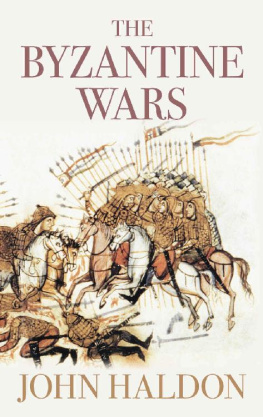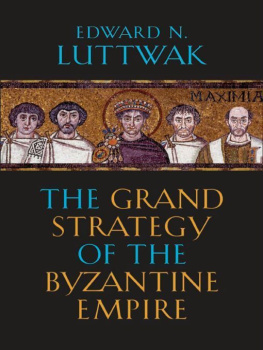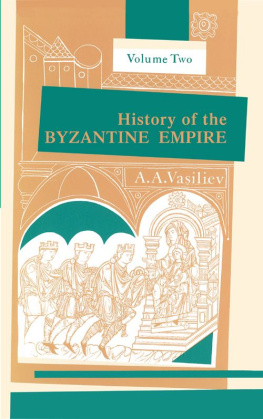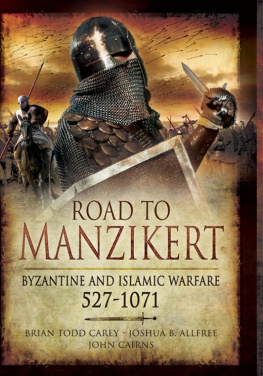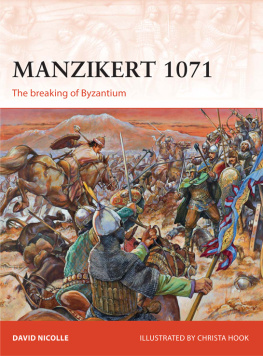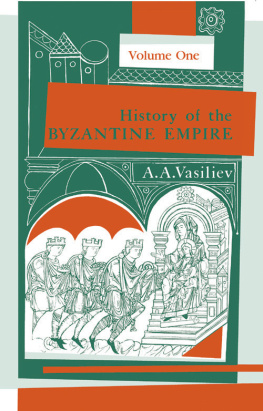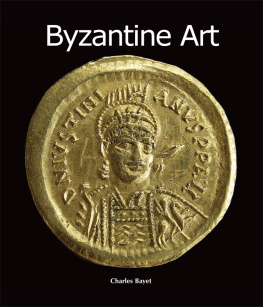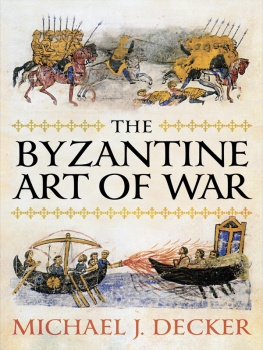THE
BYZANTINE
WARS
About the Author
John Haldon is Professor of History at Princeton University. He studied in the UK, Greece and Germany, and is a Senior Fellow at the Dumbarton Oaks Center for Byzantine Studies in Washington D.C. One area of his research focuses on the history of the early and middle Byzantine empire, in particular in the period from the seventh to the eleventh centuries. His publications include Byzantium in the Seventh Century, Three Treatises on Byzantine Imperial Military Expeditions, The State and the Tributary Mode of Production, Warfare, State and Society in Byzantium, Byzantium: A History and The Palgrave Atlas of Byzantine History.
THE
BYZANTINE
WARS
JOHN HALDON

This edition first published 2008
Reprinted 2009, 2012
The History Press
The Mill, Brimscombe Port
Stroud, Gloucestershire, GL5 2QG
www.thehistorypress.co.uk
This ebook edition first published in 2013
All rights reserved
John Haldon, 2001, 2008, 2013
The right of John Haldon to be identified as the Author of this work has been asserted in accordance with the Copyrights, Designs and Patents Act 1988.
This ebook is copyright material and must not be copied, reproduced, transferred, distributed, leased, licensed or publicly performed or used in any way except as specifically permitted in writing by the publishers, as allowed under the terms and conditions under which it was purchased or as strictly permitted by applicable copyright law. Any unauthorised distribution or use of this text may be a direct infringement of the authors and publishers rights, and those responsible may be liable in law accordingly.
EPUB ISBN 978 0 7524 9652 8
Original typesetting by The History Press
Contents
A Note on Transliteration
Books dealing with the Byzantine world generally open with a note on the transliteration of Greek or Latin words and technical terms, for the simple reason that there are several different systems in use. I have decided to use the simplest: Greek terms will be transliterated as literally as possible, but without employing macrons on long vowels (thus no or for the letters eta and omega) or the phonetic rendering of certain letters (b will be kept as b rather than v, for example, which is the way it would have been pronounced in most contexts). There are a few concessions towards standard Modern Greek phonetic transliterations thus Thessaloniki, rather than Thessalonike because these are now the common form, but not many.
Greek was the language of culture and government from the later sixth and seventh centuries, but both Greek and Latin were employed before that time. Indeed, the empire included at various times considerable areas where Latin was the main or only language parts of Italy, parts of the northern Balkan region and central and western North Africa. To Latinize Greek names of the medieval period looks odd, just as Hellenizing earlier Latin names and terms appears unreasonable or confusing. I have, inevitably, had to compromise. Technical terms and names will, therefore, be presented usually in their Latin form for the period before the year A.D. 600, and in their Greek form thereafter. This leaves many contradictions, but is the best that can be done. Where standard English versions of technical terms, personal names or placenames exist, I have used them (thus Constantine rather than Konstantinos).
Introduction
In its thousand years of existence from the reign of Justinian I (527-565) until that of the last emperor, Constantine XI (1445-1453) the Byzantine (or medieval eastern Roman) empire was almost constantly at war with one or another of its neighbours. This reflected its geography and strategic situation, centred as it was on the southern Balkans and Asia Minor. It had constantly to fend off challenges to its territorial integrity from, on the one hand, the Persian and then Arab or Turkish Islamic powers to the east and, on the other, its Balkan neighbours to the north various barbarians groups, in particular Slavs and the Turkic Avars, in the sixth and seventh centuries and then, until the thirteenth century, the Bulgars. To complicate matters, relations with the western medieval states which grew up amid the ruins of the western Roman empire from the fifth and sixth centuries on were rarely easy, and there was an ongoing political tension between the patriarchate at Constantinople and the papacy, the two major sees in the Christian world (the others being Alexandria, Antioch and Jerusalem). As the western and central European powers grew and matured first in the form of the Carolingian empire, then the German empire and the kingdom of Hungary so Byzantine political pre-eminence began to be challenged, until by the end of the twelfth century the empire had become a second-rate state, subject to the power politics of powerful western kingdoms and the commercial strength of Italian merchant republics such as Venice, Genoa and Pisa.
Throughout its history military matters were of prime importance to the empire, and it is therefore no surprise that a very considerable part of the annual revenue of the state was spent on soldiers or related issues. But while the army and the physical defence of its lands were of first-order importance, the empires political situation meant that diplomacy and politics played an equally important role. Indeed, given its limited territory and population, they were absolutely crucial to its survival, for shortage of manpower alone meant that the casual expenditure of such a valuable resource was, wherever possible, to be avoided. Hence the Byzantines reputation for clever diplomacy and, in the post-Crusader western tradition, cunning and deceitfulness hardly deserved in reality, especially in view of the record of the western powers in their dealings with the Byzantines, but an unfortunate result of western cultural prejudice. Byzantium was a society in which the virtues of peace were extolled and war was usually condemned, certainly when taken for its own sake. Fighting was to be avoided at all costs. Yet the empire nevertheless inherited the military administrative structures and, in many ways, the militaristic ideology of the expanding pre-Christian Roman empire in its heyday. These tensions were overcome through the blending of Christian ideals with the political will to survive and the justification of war as a necessary evil, waged primarily in defence of the Roman world (as understood by the Byzantines, who described themselves as Romans) and the Orthodox faith. Late Roman and medieval Christian society in the eastern Mediterranean/south Balkan region thus generated a unique culture which was able to cling without reservation to a pacifistic ideal while at the same time legitimating and justifying the maintenance of an immensely efficient and, for the most part remarkably effective, military apparatus.
In the following chapters we will look at the development of this military organization and illustrate its performance through a series of examples of actual battles. The history of the armies and their successes is not simply a military matter the ups and downs of imperial military history parallel those of the state, both in its political as well as its social and economic aspect. There were notable peaks and troughs. In the sixth century, with the resources of a still dominant empire at its disposal, the armies were able to effect a series of remarkable reconquests in many regions conquered in the previous century by Germanic peoples such as the Goths (in Italy) and Vandals (in North Africa), as well as holding off barbarian inroads into the Balkans and defeating the other major player in the western Eurasian world, the Sassanid Persian empire. In contrast, the seventh and much of the eighth century saw the massive loss of territories following the Islamic conquests of the Middle East, Egypt and eventually North Africa, with a consequent restructuring of military organisation within the empire. By the tenth century the empire had taken up the offensive once more, and by the 1030s was once again the dominant power in the eastern Mediterranean basin, its armies well led and disciplined, to the extent that the mere rumour that an imperial army was on the way was sufficient to bring most recalcitrant former allies or neighbours to heel. Yet by the time of the Fourth Crusade in 1204 the empire had been reduced to a shadow of its former self, with armies consisting mostly of foreign mercenaries and ineffective local militias. Thereafter, although it was able to make a slight recovery in the second half of the thirteenth century, the Byzantine state was an empire in name only, its armies constantly on the defensive, reduced in numbers, largely modelled and armed along western lines and barely affordable. Given this picture, the present volume will concentrate on the period up to the middle of the twelfth century, focusing in equal measure on victories as well as defeats, and the reasons for both.
Next page
